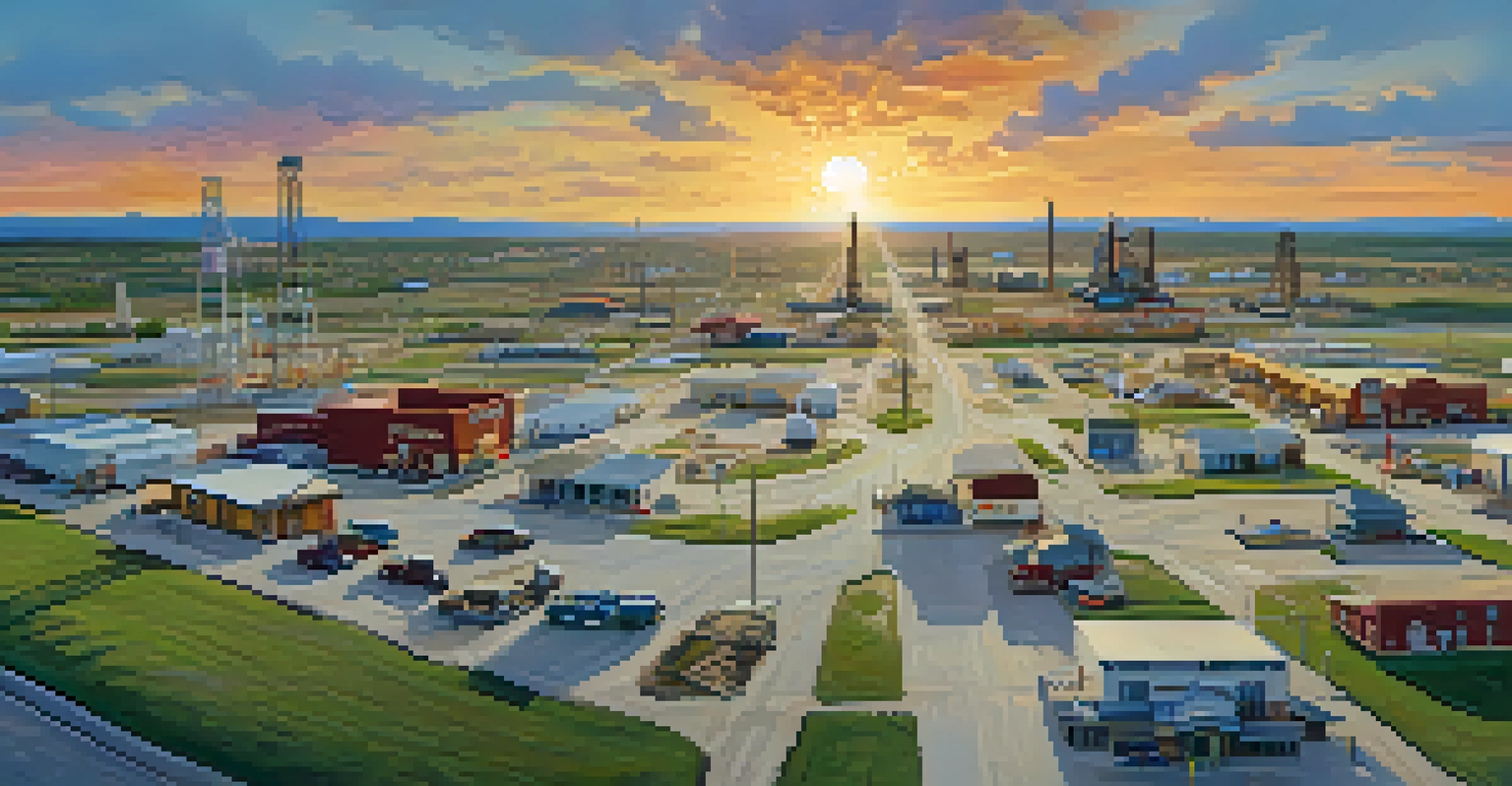Oil Boom in Texas: Revolutionizing Industry and Society

The Origins of the Texas Oil Boom
The Texas oil boom began in the early 20th century, particularly around 1901 with the Spindletop gusher. This event marked a turning point for the state, as it revealed vast oil reserves beneath the surface. Suddenly, Texas was thrust into the spotlight, becoming synonymous with oil wealth and opportunity.
The discovery of oil is a discovery of wealth, and it changes the game for everyone involved.
Before Spindletop, oil was primarily a byproduct of drilling for other resources. However, the spectacular production rates at Spindletop set off a frenzied search for oil across the state. It was a time of excitement, where fortunes could be made overnight, drawing in entrepreneurs and dreamers alike.
This initial boom laid the groundwork for Texas to become a leader in the oil industry. It attracted investments, created jobs, and sparked technological advancements that would shape the future of energy production.
Economic Impact of the Oil Boom
The economic implications of the oil boom in Texas were monumental. It not only boosted local economies but also transformed Texas into a powerhouse on a national level. The influx of money led to the development of infrastructure, including roads, schools, and hospitals, which benefited communities immensely.

Job creation was another significant aspect of the oil boom. Thousands of workers flocked to Texas for employment opportunities in drilling, refining, and transportation. This surge not only reduced unemployment but also diversified the job market, fostering a sense of stability in many regions.
Texas Oil Boom Transformed Economy
The Texas oil boom revolutionized local economies and created a diverse job market, fostering long-term economic stability.
Moreover, the oil industry attracted various ancillary businesses, from equipment suppliers to service sectors. This interconnectedness of industries created a thriving economic ecosystem that continues to thrive today.
Social Changes Triggered by Oil Wealth
As oil wealth flowed into Texas, societal changes began to unfold. Communities that were once small and rural transformed into bustling towns filled with new opportunities. The population swelled, bringing a diverse array of cultures and ideas that enriched Texas's social fabric.
The oil industry is a complex tapestry of opportunity and challenge, where innovation and responsibility must coexist.
Education and healthcare saw significant improvements due to increased funding from oil revenues. Schools were built, and hospitals expanded, leading to a better quality of life for many Texans. This shift created a more educated workforce and healthier communities, setting the stage for future growth.
However, this rapid growth also brought challenges, such as housing shortages and social disparities. The influx of wealth led to a stark contrast between the affluent and those left behind, prompting ongoing discussions about equity and access to resources in the state.
Technological Innovations in the Oil Industry
The Texas oil boom spurred a wave of technological innovations that revolutionized the industry. Techniques such as rotary drilling and seismic surveying emerged, allowing for more efficient extraction of oil. These advancements not only increased production rates but also reduced environmental impacts.
Moreover, the demand for oil led to breakthroughs in refining processes. Companies began to innovate, creating new products that extended beyond just fuel, such as plastics and chemicals, which are now integral to everyday life. This diversification of products helped stabilize the industry amidst fluctuating oil prices.
Oil Wealth Changed Social Dynamics
The influx of oil wealth led to significant societal changes, enhancing education and healthcare while also highlighting issues of inequality.
As a result, Texas became a hub for research and development in energy technologies. Universities and companies collaborated to create sustainable practices, ensuring that Texas remains at the forefront of the energy sector.
Environmental Concerns and the Oil Boom
While the oil boom brought economic prosperity, it also raised significant environmental concerns. The extraction and refining processes have historically led to pollution and habitat destruction, prompting debates about the sustainability of such practices. Many communities began to voice their concerns regarding air and water quality.
In recent years, the focus on environmental issues has intensified, leading to stricter regulations and a push for cleaner energy alternatives. The oil industry is now faced with the challenge of balancing economic growth with environmental stewardship. This has spurred innovations in cleaner extraction methods and renewable energy investments.
As Texas grapples with these issues, there is a growing recognition that a sustainable approach is crucial for the future. The ongoing dialogue about the impact of oil on the environment reflects a broader global concern about climate change and resource management.
Cultural Influences of the Oil Industry
The oil boom has profoundly influenced Texas culture, shaping its identity in ways that are still felt today. From music to literature, themes of wealth, ambition, and resilience permeate the artistic expressions of the state. The narratives surrounding the oil industry have become part of the Texan mythos, celebrated in songs and stories.
Events like the Houston Livestock Show and Rodeo, which began as an agricultural fair, have evolved to include oil industry showcases, reflecting the intertwined nature of these sectors. This cultural blending highlights the significance of oil not just as an economic driver but as a component of community pride.
Environmental Challenges Emerge
While the oil industry brought prosperity, it also raised critical environmental concerns, prompting a push for sustainable practices and cleaner energy alternatives.
Moreover, the oil industry's impact on Texas culture fosters a sense of camaraderie among its workers and communities. Shared experiences of hardship and triumph have forged bonds that transcend the challenges posed by the boom-and-bust cycles of the industry.
Future of the Oil Industry in Texas
Looking ahead, the future of the oil industry in Texas is a topic of much discussion. While oil remains a vital part of the state's economy, the shift towards renewable energy sources is becoming increasingly evident. Texas is already leading the nation in wind energy production, showcasing its capacity to adapt.
However, the oil industry isn't going away anytime soon. With the global demand for oil still high, Texas continues to play a crucial role in meeting that need. The challenge lies in how the state will integrate new technologies and practices to make the industry more sustainable and resilient.

Balancing economic growth with environmental responsibilities will be key to Texas's future. As the state navigates this transition, it will need to embrace innovation and collaboration to ensure that it remains a leading force in the energy sector while fostering a healthier planet.